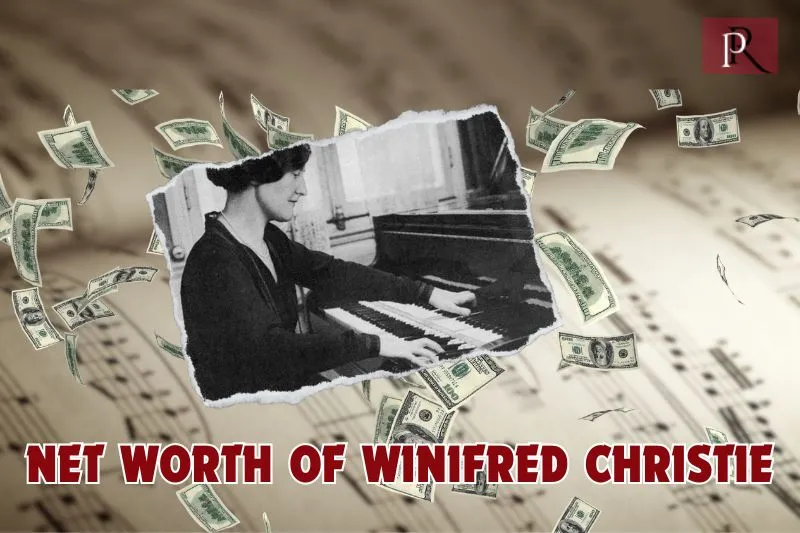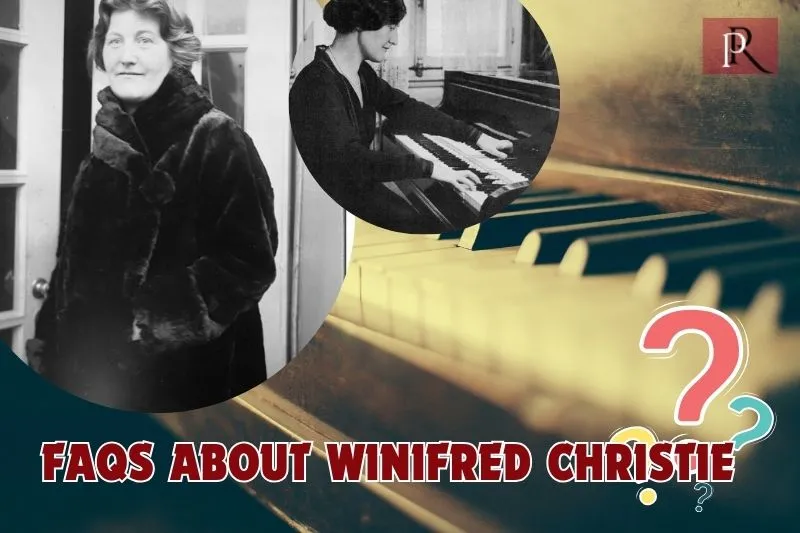Winifred Christie, a famous pianist, made significant contributions to classical music.
In this article, we delve into his career, achievements, and fascinating aspects Winifred Christie net worth. Find out how her musical journey translated into her net worth and the lessons aspiring musicians can learn from her life.
Quick information
| Real name | Christie Winifred |
| Popular name | Christie Winifred |
| Sex | Female |
| Date of birth | February 26, 1882 |
| Age at death | 82 |
| Parents | do not apply |
| Siblings | do not apply |
| Place of birth | Stirling, Scotland |
| Nationality | brother |
| Nation | scotist |
| Education | Royal Academy of Music |
| Marital status | Married |
| Sexual orientation | do not apply |
| Wife/Wife/husband | Emanuel Moor |
| Children | do not apply |
| Dating | do not apply |
| Net value | do not apply |
| Origin of wealth | Music, performance, invention |
| Category | Classic music |
| Height | do not apply |
What is Winifred Christie’s net worth 2024?

Discussing the net worth of historical figures like Winifred Christie can be challenging due to the lack of specific financial data at the time.
However, given her influence and the groundbreaking nature of the Moór-Duplex piano, her economic impact was significant in the field of classical music.
To make a contemporary comparison, artists such as Lang lang And Yuja WangBoth have transformed classical music with their unique styles and global appeal, and have net worths estimated to be in the millions.
Winifred Christie Full Overview and Wiki
Pioneer of the Moór-Duplex piano
Winifred Christie is no ordinary pianist; She was a pioneer who advocated the Moór-Duplex piano, a unique invention of her husband Emanuel Moór.
This instrument, with its two keyboards and the ability to play spaced octaves, revolutionized the way music was performed, providing sounds that were previously impossible.
Winifred toured extensively, bringing this innovation to audiences across Europe and the United States, profoundly impacting classical music.
The Moór-Duplex Piano: A Technological Marvel in Classical Music
Moor-Duplex piano stands out not only because of its double keyboard but also because of the new ways of musical expression it facilitates.
This piano allows performers to perform complex musical passages that would normally require two pianists.
Winifred used the instrument to explore and expand the boundaries of classical music, leaving a lasting impact on the industry.
Main performance and launch
Winifred’s career was marked by a number of important premieres and performances. She introduced audiences to new works and composers, enhancing her reputation as the leading classical pianist of her time.
Her performances not only demonstrate her exceptional skill but also her dedication to developing the classical genre.
Recording career
Although details are sparse, she made select recordings that contribute to our understanding of early 20th-century classical music.
These recordings are beloved artifacts, offering a glimpse into her artistry as well as the sonic capabilities of the Moór-Duplex piano.
Educational and legacy contributions
In addition to performance, Winifred is committed to education and legacy in music.
Her contributions, including the establishment of the Westminster Central Music Library and a scholarship to the Royal Academy of Music, demonstrate her commitment to future generations of musicians and the influence of her art. classical pianist for music.
The revival and continued influence of the Moór-Duplex piano
Today, the Moór-Duplex piano is more than just a musical instrument; it is a symbol of innovation in classical music.
The efforts to revive and preserve this piano have highlighted Winifred’s lasting impact on the world of music, ensuring that her influence continues to resonate within the classical community.
Personal life
Her personal life is deeply intertwined with her music. Married to Emanuel Moór, the couple not only shared a life together but also a profound musical collaboration that brought the Moór-Duplex piano into the spotlight.
Social Media
do not apply
Frequently asked questions about Winifred Christie

Who is Winifred Christie?
Winifred Christie was an English pianist and composer, celebrated for her advocacy of the Moór-Duplex piano.
When was she born?
She was born on February 26, 1882 in Stirling, Scotland.
What is she known for?
Christie is best known as an advocate of the Moór-Duplex piano, a unique instrument designed by her husband.
Is Winifred Christie performing in New York?
Yes, she previously attracted attention for her piano recitals in New York.
Where did she study music?
She studied at the Royal Academy of Music in London, where she was awarded a Liszt Fellowship and also studied with Oscar Beringer.
Who did Winifred Christie marry?
In 1923, she married Emanuel Moór, a composer and inventor who designed the Bechstein-Moór Duplex Grand Piano.
What is a Moor-Duplex piano?
The Moór-Duplex piano is a double keyboard instrument with 164 keys, allowing for more than two octaves with one hand, designed by Emanuel Moór.
Does she compose music?
That’s right, she also composes concertos, chamber music and solo piano works in addition to her performances.
What did Winifred Christie do after World War II?
After the war, she founded the Central Music Library and established a scholarship at the Royal Academy to revive interest in the Moór-Duplex piano.
When did she die?
She died on February 8, 1965 in London.
Conclusion
Winifred Christie made significant contributions to classical music. In this article, we delve into her career, achievements, and fascinating aspects of her financial legacy.
Learn how her musical journey translated into net worth and the lessons aspiring musicians can take from her life with https://rachelparris.com/.
Categories: Musician
Source: dut.edu.vn






